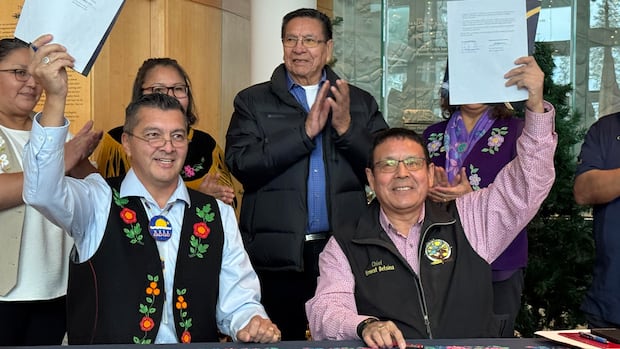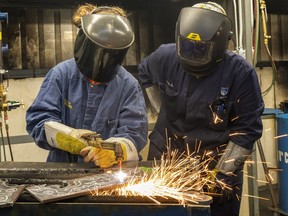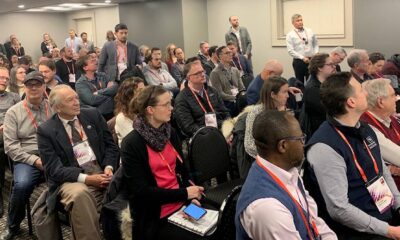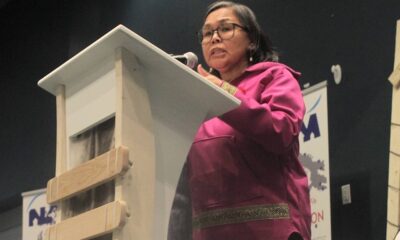Top Stories
Tłı̨chǫ and Yellowknives Dene Sign MOU for Arctic Corridor

UPDATE: In a pivotal development for Arctic infrastructure, the Tłı̨chǫ government and the Yellowknives Dene First Nations (YKDFN) have just signed a memorandum of understanding (MOU) to jointly lead the Arctic economic and security corridor project. The signing occurred on Monday, October 16, 2023, at the N.W.T. Legislative Assembly in Yellowknife, with significant attendance from chiefs, territorial, and federal representatives.
Grand Chief Jackson Lafferty and Chief Ernest Betsina emphasized the importance of this partnership, marking a shift in leadership for major projects affecting their lands. Lafferty stated, “We’ve learned from past experiences with industries coming into our backyard and making all the decisions. We are going to flip that around now; we are going to lead the mega-project. [The project] will be on our terms moving forward.”
The ambitious Arctic corridor aims to establish an all-season road connecting the N.W.T. to a port at Grays Bay, Nunavut. However, it has not yet made it onto Prime Minister Mark Carney’s initial list of nation-building projects for fast-tracking. This project, passing through Tłı̨chǫ and YKDFN territory, is expected to create jobs, support skill training, and generate long-term contracts for local community members.
Betsina highlighted the transformative potential of the corridor, stating, “This project will support jobs and skill training and has the potential to change transportation.” Both leaders underscored the need for ongoing discussions with federal and territorial governments, noting that many aspects of the project remain in the preliminary stages.
The commitment to safeguard land and wildlife, including caribou, during the project was also a focal point. Betsina assured the community, “Our members will be asked for their views on land use, access, environmental considerations, and economic opportunities,” emphasizing the necessity for traditional knowledge from elders to guide their decisions.
In addition to forming working groups and conducting environmental studies, the leaders plan to create a comprehensive proposal for the federal government. Lafferty expressed his vision for the project’s longevity: “This is a long-lasting legacy that we’re going to start working on. It’s a mega project that’s going to last 50 to 100 years down the road. It has to involve the communities.”
As this story develops, community engagement and collaboration with government entities will be crucial. Experts and residents alike are keenly watching how this initiative will unfold, with the potential to reshape Arctic development and ensure Indigenous leadership in crucial infrastructure projects.
Stay tuned for more updates on this groundbreaking initiative as the Tłı̨chǫ and Yellowknives Dene First Nations take decisive steps towards a new era of Arctic cooperation and economic opportunity.
-

 Politics3 weeks ago
Politics3 weeks agoSecwepemc First Nation Seeks Aboriginal Title Over Kamloops Area
-

 World4 months ago
World4 months agoScientists Unearth Ancient Antarctic Ice to Unlock Climate Secrets
-

 Entertainment5 months ago
Entertainment5 months agoTrump and McCormick to Announce $70 Billion Energy Investments
-

 Lifestyle4 months ago
Lifestyle4 months agoTransLink Launches Food Truck Program to Boost Revenue in Vancouver
-

 Science5 months ago
Science5 months agoFour Astronauts Return to Earth After International Space Station Mission
-

 Technology3 months ago
Technology3 months agoApple Notes Enhances Functionality with Markdown Support in macOS 26
-

 Top Stories2 months ago
Top Stories2 months agoUrgent Update: Fatal Crash on Highway 99 Claims Life of Pitt Meadows Man
-

 Lifestyle3 months ago
Lifestyle3 months agoManitoba’s Burger Champion Shines Again Amid Dining Innovations
-

 Sports5 months ago
Sports5 months agoSearch Underway for Missing Hunter Amid Hokkaido Bear Emergency
-

 Politics4 months ago
Politics4 months agoUkrainian Tennis Star Elina Svitolina Faces Death Threats Online
-

 Politics4 months ago
Politics4 months agoCarney Engages First Nations Leaders at Development Law Summit
-

 Technology5 months ago
Technology5 months agoFrosthaven Launches Early Access on July 31, 2025





















